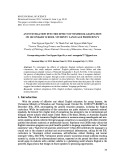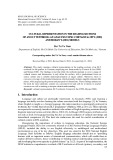
Does a country need good citizens? Certainly, it does. But should the main goal of education be to teach
students to be good citizens? No. While nurturing good citizens should be a primary goal, it should not be
more important than preparing students for the workforce.
Upon graduation, most students head out into the workforce. At this crucial moment in their lives, what
is more important: their citizenship or their ability to become gainfully employed? As important as good cit-
izenship is, it does not pay the bills, and a society full of citizens who cannot support themselves will have
many serious problems.
Indeed, preparing young people for the workplace by providing them with analytical and technical skills
is essential for economic growth. Today more than ever, economic success is created and maintained by indi-
viduals who can run small businesses, make scientific advances, manage information, and labor in increas-
ingly technical manufacturing settings. A country of good citizens who lack the skills necessary to maintain
a stable economy will struggle financially and, therefore, socially and politically. How will the government
fund programs and provide necessary services to its citizens? How much will those good citizens suffer if the
country cannot support itself or has to compete with other countries for resources? How would it defend itself
in a time of war without a prepared, well-funded military?
However, this does not mean that education should focus primarily on workforce preparation. Eco-
nomic stability is not the only factor in a society’s success. For people to want to live and work in a society,
they must learn about and value the core beliefs of that society. Likewise, they must understand and partic-
ipate in the workings of that society. They must also respect and value their fellow citizens and their envi-
ronment. They must, in short, be good citizens, and it should be the duty of our schools to teach them how
to be.
In the United States of America, for example, children are taught the Pledge of Allegiance from the ear-
liest days of kindergarten; they are taught to respect the flag and all that it stands for. In later grades, those
children learn about the U.S. government, election processes, legal system, and tax system. This knowledge
will help to create good citizens who can serve on a jury or in the military, understand their duty to pay taxes,
vote to elect officials, and develop projects and programs that support and improve their communities.
For the United States to maintain its success and achieve its goals in technological growth, space travel,
military operations, environmental issues, and hundreds of other areas, we need educated citizens who are
well prepared for the workplace. A thriving, skilled workforce bolsters the economy and keeps money circu-
lating
—
money that funds our government through taxes. Without financially successful citizens, the coun-
try’s sources of revenue would soon diminish.
Thus, the main goal of education should not be primarily to prepare students for the workforce or teach
them to be good citizens but rather to prepare students for the workforce while teaching them to be good cit-
izens. To continue to succeed in our increasingly global world, to maintain our country’s standard of living,
and to keep America a place where people want to live and work, our schools must prepare good citizens and
educated workers.
–AWA PRACTICE–
293

Prompt #4:
Every employee deserves a certain amount of privacy in the workplace, whether that means a private
office or cubicle or the ability to make private phone calls or e-mails.
The issue of employee privacy in the workplace is a sensitive topic for both employees and employers.
Employers often feel that private matters interfere with work and do not belong in the workplace, but the real-
ity is that employees sometimes need to make personal calls, send private e-mails, or discuss private matters
with colleagues. Further, a little privacy can often go a long way to improving employee productivity. In my
opinion, employees deserve to make personal calls and send private e-mails, within guidelines, and they
deserve additional privacy for their work if it can improve job performance.
An employee deserves a private office if the actual job requires the privacy of a room and a door. For
example, when I worked as a professional trainer at a regional bank’s corporate headquarters, I had to dis-
cuss training skill levels with employees who attended my classes. As I only had a cubicle, we had to discuss
their performance within listening range of other employees. Any type of employee evaluation is a private
matter and should take place behind closed doors. In addition, many employees work on projects that require
the discussion of sensitive issues with clients either in person or on the phone. These employees should have
offices where this kind of work can take place in privacy.
Private office space is often limited, but that doesn’t mean employees can’t have at least some degree of
privacy. Cubicles or other privacy-providing devices can often help employees focus on work and improve
job performance. In a separate area of the bank where I was employed, the clerical staff members had their
desks positioned in a large open area. They had no means of attaining privacy either for work or personal mat-
ters. They were free to chat easily throughout the day, but usually chatted more than they worked. The instal-
lation of cubicles quieted the area and significantly improved work efficiency.
One of the most complex workplace privacy issues is e-mail. Do employees have the right to send per-
sonal e-mails from the workplace? Do employers have the right to read employee e-mails? Unlike phone calls
that must sometimes be made during the day to tend to family matters, e-mails
—
because they leave a writ-
ten record in cyberspace
—
create liability issues for the employer. Although I dislike the idea of “Big Brother”
watching, I believe it is fair for an employer to monitor e-mail activity on business e-mail accounts. However,
it is imperative that employees know that their e-mails may be monitored.
On the other hand, I do not believe employers have the right to read employee e-mails sent from per-
sonal accounts. If I access my Hotmail or Yahoo e-mail account from work during my break, for example, I
should be free to write whatever I want to whomever I please without the possibility of my employer read-
ing my message. Of course, as a responsible employee, I must be careful not to send private e-mails of this
sort on company time, and my employer has every right to establish a policy limiting such e-mails to break
time.
Where the issue of privacy seems most clear to me is in regard to private telephone calls, which employ-
ees do deserve. All employees, at one point or another, need to make or receive personal calls during busi-
ness hours, whether it is to make a doctor appointment or to assist a family member, and they should be
allowed to make these calls in private. Of course, the number and duration of these calls should be limited,
and if they interfere with work or abuse the privilege, the employee deserves to be reprimanded, but the
–AWA PRACTICE–
294

employer does not have a right to listen in on these phone calls. Instead, employers should make sure per-
sonal call guidelines are clear (e.g., that long-distance calls will be tracked and billed to employees), and pri-
vate space for such calls should be provided in a break room, office, or other area.
We all value our privacy, and a certain degree of privacy in the workplace is necessary to keep employ-
ees satisfied and productive. Allowing personal phone calls and e-mails according to reasonable guidelines
and providing private workspace is a small concession to employee satisfaction and productivity.
Prompt #5:
Without competition, people stop trying to improve and become complacent. Competition is therefore
good for individuals and businesses alike.
From a child’s first science fair to man’s first steps on the moon, competition has spurred people to do
their best. Competition can be the best motivation for individuals and businesses alike to accomplish great
goals. Without competition, we lose the incentive to do better and we become complacent. Indeed, both indi-
viduals and businesses benefit from competition.
A sense of competition has been the key to improving business at our local home and garden store,
which is part of a national chain. Until recently, the large store was the only one to offer a wide array of home
and garden products to our small city. But shoppers found a disinterested staff of people who were unwill-
ing to help beyond pointing to an aisle. Complaints to local management were not taken seriously. As a result,
complacency was negatively affecting business. Many people chose to drive out of town to shop at a place that
seemed to care more for its customers.
The recent arrival of an equally large competitor has brought some much-needed change to the first
store. Now customers see willingness from staff to answer questions and to assist in finding items. Store man-
agement is motivated to address customer concerns and complaints. New competition has improved the way
the store does business and has allowed it to keep some of its former customers instead of sending them all
to the competitor.
Here is another example of how competition benefits a business, its employees, and customers. One of
my previous employers was a retail clothing store. Members of the sales staff were given quotas, and the quo-
tas were posted on charts for everyone to see. At the end of each day, actual sales figures were recorded on
the quota chart. The daily competition motivated sales staff to try harder to increase sales by asking customers
if they wanted to purchase an extra tie, shirt, or maybe a pair of socks. The store reaped large profits, and the
staff enjoyed bonuses for increased sales.
Of course, it is true that some people have an overdeveloped sense of competition. For them, everything
is a contest, and they can make life difficult for themselves and everyone around them. It is also true that some
people simply do not do well in competitive situations, while others have lost the will to compete after hav-
ing lost too many times. But most of us do have a healthy sense of competition, and most of us learn to bet-
ter ourselves after the experience of a loss. More importantly, most of us have accomplished things we never
thought possible because we were determined to beat the competition.
As school students, we are spurred to do our best in science fairs to compete for first place ribbons. Stu-
dents go on to compete as members of the band, math team, or any sports team. As adults, we compete in
–AWA PRACTICE–
295

the workplace for a variety of reasons
—
to gain clients, improve sales, earn grants, or to garner recognition.
Our society revolves around competition, whether we are in school, at work, or watching professional sports
and reality shows on television. Competition motivates individuals and businesses to do their very best; it fos-
ters creativity and hard work. Without it, we quickly fall into complacency, which leads us to settle for less
than we can achieve.
Prompt #8:
A creative person can succeed, but not without diligence. Diligence is the most important factor in success.
If a creative person never applies herself, how is she to succeed? What good are the creative forces if no
effort is made to create? I agree a creative person needs diligence to succeed. However, I think diligence is just
one of the possible factors contributing to success, not necessarily the most important factor.
Artist Mary Engelbreit began drawing and painting as a young child and grew to become a talented
artist. As a young woman she wanted to illustrate children’s books, but found a limited response to her
requests for work. Yet she was diligent and kept creating her art, despite the rejections. She soon found a recep-
tive market for her distinctive artwork in the field of greeting cards.
Today Mary Engelbreit owns a large, flourishing company and is responsible for the creative design of
the successful magazine Home Companion, home décor accessories, greeting cards, and numerous other
licensed products, all of which utilize her colorful artwork. If she had not worked hard to promote her art
and ideas, she would not be so successful today.
But is diligence the only factor in Engelbreit’s success? No, it is not. While she is a naturally creative per-
son, without natural talent, Engelbreit probably would not have found a market for her art, no matter how
hard she tried. There must be something valuable in her work, whether it is a distinguishing style, emotive
force, or unique vision, to make others appreciate her art. Her diligence was instrumental in getting her work
recognized, but the root of her success is her natural talent.
Belief in one’s talent is another important factor in an artist’s success. Time and again, great artists will
describe how their work was rejected over and over and over, but they ignored rejection letters and the crit-
ics who told them they didn’t have talent. Imagine, for example, if Thomas Edison believed the educators who
threw him out of school and told him he would never amount to anything. Imagine if director Stanley
Kubrick had listened to critics who panned works like 2001: A Space Odyssey because they didn’t grasp the
film’s brilliance. But Edison and Kubrick kept at their work, believing in themselves and their talents, and this
belief fueled their diligence.
Another element of success is often luck. I once asked a college president how he became so successful
in his career. He listed the following reasons: intelligence, hard work, determination, and luck. He explained
there were several points in his career where luck was his only explanation as to why he advanced to another
level. When discussing the road to success, many famous actors and singers describe their lucky breaks, the
audition nearly missed or the chance meeting with a producer.
Success is the result of many factors ranging from natural creative talent, to luck, to intelligence, to dili-
gence. Diligence is certainly an important factor, but it is not the only one. A creative person will not be suc-
cessful if he or she is not diligent about creating work, whether it is paintings, symphonies, novels, sculptures,
–AWA PRACTICE–
296

or any other creative endeavor. Without the effort to produce, the creative person will have nothing to share
and thus no chance of success.
Prompt #9:
Today’s highest paid teachers are those who teach high school and college students. But the most impor-
tant years in a human being’s educational development are the earliest years. Therefore, early child-
hood educators should receive the highest salaries.
When looking at teacher salaries, it is true that “today’s highest paid teachers are those who teach high
school and college students.”And although the earliest years in a human being’s educational development are
so important because they serve as building blocks to later learning, one cannot diminish the importance of
education attained at the high school and college levels. Furthermore, I disagree with the claim that “early
childhood educators should receive the highest salaries.” I believe that all levels of educational development
are important, and early childhood teachers do not merit the highest pay simply because they teach children
during the most formative years.
The learning that takes place in the first few years of school sets the stage for learning later in life. The
fundamentals of critical academic skills, including reading, math, spatial relations, problem solving, and inter-
personal relations, are taught in preschool and kindergarten. These skills are the building blocks of all future
learning. One could therefore argue that these early years are the most crucial years in a child’s academic
development, and in a sense, they are right
—
for without these building blocks, higher learning could not take
place. But does that mean that the teachers of these fundamental
—
but also most simple
—
skills deserve the
highest salaries? No, it does not.
Although students are beyond the “crucial early years” in primary and secondary school, what they learn
is of great importance. Reading and learning about our world and its people, science, and math at the sec-
ondary level help prepare students to think critically. They need to be taught to receive detailed information
(by reading, for example), to analyze that information, and then to make rational decisions. This process is
emphasized at the high school and college levels to prepare students for future careers. So while talented edu-
cators at the elementary schools are crucial to teaching the basic educational and lifetime skills, educators in
high schools and colleges are necessary to teach analytical and career skills. Indeed, teachers are important
at all levels for they all teach varied yet necessary information and skills.
How, then, should salary be determined? A standard method should be utilized for teachers at all lev-
els. Most learning institutions already do this to some degree, determining salary based on a teacher’s edu-
cation and years of experience. A teacher with more years of experience should be compensated more than
a newcomer to the field. Likewise, a teacher with an advanced degree should be paid more because he or she
can teach a subject in greater depth than a less qualified colleague. That is why most of today’s highest paid
teachers happen to be those at the high school and college level. Those teachers typically require more edu-
cation and/or more experience to meet the demands of teaching more difficult subjects that must be explored
with greater scrutiny. Most college professors, for example, have their Ph.D. while only a small percentage of
early childhood educators have their masters.
–AWA PRACTICE–
297












![Tài liệu Từ vựng tiếng Anh Trung cấp [mới nhất]](https://cdn.tailieu.vn/images/document/thumbnail/2025/20250913/nguyentuan250421@gmail.com/135x160/99491757910839.jpg)
![Tài liệu Từ vựng Tiếng Anh theo chủ đề [mới nhất]](https://cdn.tailieu.vn/images/document/thumbnail/2025/20250913/namdhuet@gmail.com/135x160/83251757753810.jpg)



![Tài liệu Từ vựng tiếng Anh cho bé [chuẩn nhất/mới nhất]](https://cdn.tailieu.vn/images/document/thumbnail/2025/20250731/huadaithesang2509@gmail.com/135x160/18631754013896.jpg)








